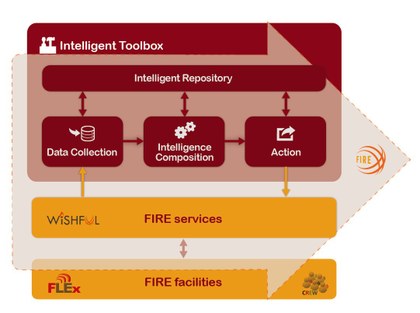Leadership in enabling and industrial technologies - ICT - eWINE
H2020 LEIT ICT

Partners: 10 partners from 8 European countries:
• imec VZW – Belgium (coordinator)
• The Provost, Fellows, Foundation Scholars & the Other Members of Board of the College of the Holy & Undivided Trinity of Queen Elizabeth near Dublin - Ireland
• Technische Universität Berlin - Germany
• Technische Universität Dresden - Germany
• Institut Jozef Stefan - Slovenia
• Thales Communications & Security SAS - France
• Martel GMBH - Switzerland
• SigFox Wireless SA - France
• Innovative Solutions Slawomir Pietrzyk - Poland
• Spacetime Networks Oy – Finland
Start: 1 January 2016
eWINE is a Collaborative project for experimentally-driven research on top of existing experimental infrastructures including necessary extensions, adaptations or reconfigurations that serve the experiments. The main goal is to solve the existing shortcomings in dense & dynamic wireless networks through experimentally-driven research performed on FIRE facilities offered by the FP7 CREW, Fed4FIRE, OpenLab, EVARILOS, FORGE, FLEX and H2020 WiSHFUL projects.
The elastic Wireless Networking Experimentation (eWINE) research project realizes elastic networks that can scale to a high number of users in a short timespan through the use of an agile infrastructure (intelligent software and flexible hardware), enabling:
- dynamic on-demand end-to-end wireless connectivity service provisioning
- elastic resource sharing in dense heterogeneous and small cell networks (HetSNets)
- intelligent and informed configuration of the physical layer.
eWINE develops and validates algorithms for advanced Cognitive Networking (context determination & sensing, optimization & negotiation techniques, and online learning algorithms) through experimentally-driven research on top of existing FIRE/FIRE+ facilities (CREW, WiSHFUL, FLEX).
The consortium includes both academic researchers and industrial developers (3 SMEs + 1 multinational company). The uptake of the project results are promoted by (i) making openly available the Intelligence Toolbox and organizing the eWINE Grand Challenge; (ii) through Open Calls of WiSHFUL; and (iii) by educating the wireless community.
To cope with the increasing density of wireless devices, eWINE primarily addresses the EU’s need for intelligent solutions to mitigate the spectrum scarcity and network configuration problems and strengthen the competitiveness of European companies (reducing development costs, speeding product validation and shortening time-to-market) in developing innovative products able to increase wireless capacity and energy efficiency, and lower electromagnetic exposure. The project results will lead to improved European innovation in several domains (secured & robust communication, IoT, 5G, etc.). eWINE will leverage research to exploit the full potential of the coordinated use of heterogeneous wireless networks, and as such will contribute significantly to regulatory policies and standardization.
Objectives
These are the objectives of eWINE
- eWINE will enable on-demand end-to-end basic wireless connectivity capable of delivering elastic connectivity services from an Over-The-Top (OTT) service provider to fixed and mobile wireless devices within dense network scenarios.
- eWINE will enable elastic resource sharing in dense deployments of heterogeneous and small cell networks (HetSNets) in a dynamic way to provide stable connections guaranteeing a well understood and stable probabilistic model of Quality of Service to the many wireless services running on the wireless devices.
- eWINE will develop and evaluate an open and reconfigurable physical layer that is able to intelligently adapt radio parameters to the context for addressing a wide range of services and requirements that HetSNets need to support.
- eWINE will further educate the research community, industrial professionals as well as the general public to increase awareness of problems that occur in dense and dynamic wireless networks and possible solutions to these, thus promoting the uptake of the project results
Role of Ghent University
The IDLab core research group embedded at the Ghent University is coordinator
Contact
Prof. Ingrid Moerman
Department of Information Technology (IDLab)
Phone number: 09 33 14 926
E-mail: ingrid.moerman@ugent.be